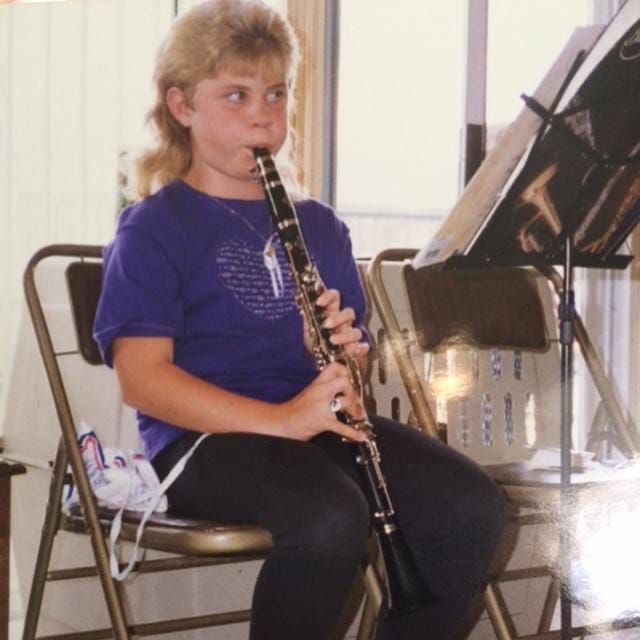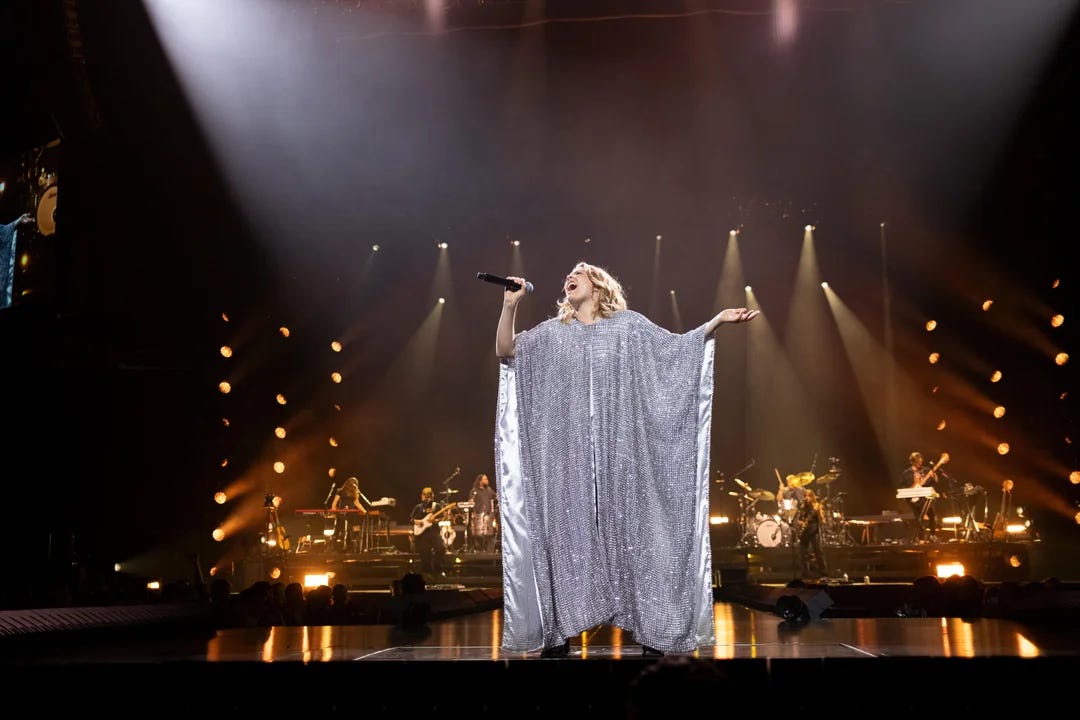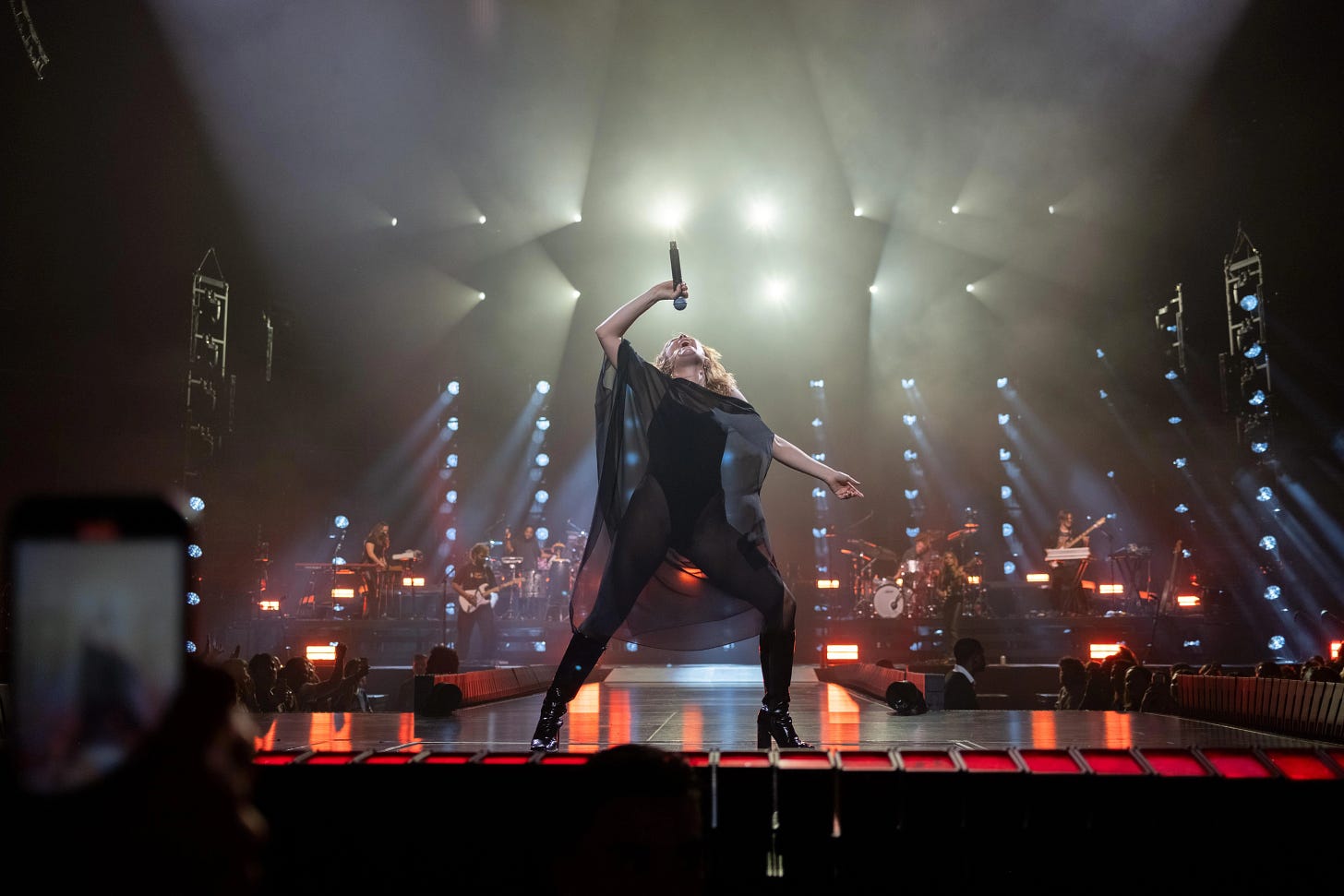A few weeks ago, my friend Jess texted me and told me that she’d purchased tickets to see Maggie Rogers on a whim. Would I like to go? I replied immediately that yes, I would love to go. I have been a Maggie Rogers superfan since her first album, “Heard It In A Past Life” came out; however, I’d never been able to catch her live.
The moment Maggie emerged from below the stage in a sparkling silver gown, I felt a clutch of delight in my stomach — an immediate sense of gratitude that I’d pushed past being tired to be in this space. Instead of feeling tired and regretting the late night, I came home energized and nourished.
While I love Rogers’ music, lately, I’ve been more interested in how she creates and lives her life as an artist. I love getting hyper-fixated on artists: only listening to their work, reading interviews with them, listening to podcasts they’ve been a guest on, and consuming as much information as possible.
When Rogers talks about her process, she gets…weird:
She speaks about songwriting as a full-body process. “When I’m writing, the first thing I do is take my shoes off. My hands get hot. It’s so fucking physical,” she said. The work also seems to require a kind of spiritual stillness. “It’s like a puzzle,” she said. “If you can keep your focus on it for long enough, it appears. It’s right there—but the second your brain moves it’s gone.” She often enters a kind of hyper-focussed state. “When I’m onstage, or when I’m making something, I’m not thinking about who I am or what I’m trying to do. Time gets really sinewy. It’s spidery and slow. There’s wonder. And it’s just special, and I’m in it, and my hands are up, and I’m figuring it out. And then I come out of it, and it doesn’t even ever feel like it was mine to begin with.”
I love to read about artists’ routines. I’m always hoping to find something I might find to transform my practice. I also find this level of earnestness embarrassing. I was a teenager in the 90s when the collective humor of the generation revolved around making fun of everyone and everything. Being caught caring too much was a fate worse than death.
When I dig beneath the feelings of embarrassment, I find that they’re covering up a mix of shame and envy. I think of all of the people who have suggested that I not get my hopes up or mocked me when I’ve blathered on about my rituals. I feel jealous of people who don’t let other people’s stupid comments derail them — people who claim their role as an artist and orient their lives around creating.
I’ve been slowly allowing myself to grieve that my memoir will likely live in my Google Drive and not as a book the way I’d hoped and worked for. It’s embarrassing to tell people that this thing you’ve spent years writing, revising, and querying isn’t going to amount to anything but a collection of documents and dashed dreams.
People have tried to encourage me and explain it away: selling memoirs is complex, the industry is a mess, agents are busy, you have to have a massive online following to publish personal work these days, and other well-intentioned thoughts about why it didn’t happen.
What I keep returning to when I am quiet and honest is that I’m not sure it was my best work. I don’t mean the quality of writing (though, surely, that could have used some work, too) but the honesty of it. When I read the first iteration, I saw how hard I tried to tie things up in a bow and be heartfelt and inspirational. In the second iteration, I worked to make every essay funny and weird, and while I am both funny and weird, the result was something that didn’t quite sound like me.
Sometimes, I catch myself worrying more about what my writing “career” looks like — getting into the right workshops, publishing (or not, like this year), securing an agent, having brag-worthy things happen that I can post on Instagram as proof that the effort is worth it — than what it feels like to me or to others.

When I was younger, I was a musician. I started in my elementary school band program before eventually being accepted to youth symphonies and honor bands (no brag!).
My favorite conductor was a kind, jolly older man named Horatio who lead the youth symphony I played in. There was only one other clarinet player, a girl named Elizabeth, who became a friend even though we took turns being first chair or competing for solos or seats. At the beginning of one of our symphony seasons, Elizabeth and I had to audition to see who would be first chair that year.
We sat in on one another’s auditions, and I have to admit that I was elated when my audition was flawless, and Elizabeth made a minor mistake. I was sure that I’d earned first chair.
Instead, when the results of auditions were posted, Elizabeth was listed as first chair. I thought Horatio had made a mistake — my audition was perfect! Had he missed the part when Elizabeth played the wrong note?
When I arrived at rehearsal, Horatio pulled both Elizabeth and me aside. He congratulated us both, and then said something that I’ve never forgotten. He explained that Elizabeth was “Princess of Tone” and I was “Princess of Technique.” He explained that while being technically correct was important, ultimately, music is about how it makes you feel. Elizabeth’s tone was bright and effortless, and even though my performance was “correct” it lacked the lightness and joy of someone playing with feeling and heart. I’ve never forgotten it; however, I’ve also never given up trying to make things look and sound right, as opposed to letting beauty or joy or emotion guide me to what is true.
One of the things that struck me most about Maggie’s performance was how she moved non-stop through the show. It’s captivating and electric to watch this tiny human strut around the stage, gyrating, kicking, jumping, and feeling. I’m not the only one who has noticed: A New Yorker profile of Maggie says, “Onstage, Rogers can be a little wild. Her movement is spontaneous, erratic; she can appear almost possessed.” It’s shocking at first — her movements are frenetic and jarring, yet somehow graceful. It’s beautiful to watch.
In an interview on the Zane Lowe podcast, he asked Rogers about her intense stage presence. She replied, "I'm not thinking about how I sound or how I look. I'm thinking about, like, what's happening in my body and how much I can actually inhabit the song."
I replayed this part of the interview so many times and wondered what it means for me to inhabit my art.
Everyone has heard the Zora Neale Hurston quote from Their Eyes Were Watching God: “There are years that ask questions and years that answer.” Respectfully, I would like to add that some years feel like you’ve been turned upside down, held by your ankles, and shaken until everything rains out of your pockets and your head fills with blood. After the turmoil, standing upright again takes a few minutes to get your perspective because your vision is clouded with stars and spots. It’s intense, and in the moment, it’s highly unpleasant, but eventually, things settle out, but your vision is different.
When I think about the next iteration of my life and work, I feel like I’m still finding my footing and waiting for things to come into focus after being turned upside down. At the end of a recent appointment, my beloved therapist said she “can see I’m in a growth spurt,” which is adorable and accurate: my whole body and life feel like they’re aching for an overhaul. I’m not craving Big Life Changes (I plan to stay at my job, in my marriage, in my city, in my house), but the small shifts that make a life feel different. I want to stop caring about how my life and practices look to others. I want to hear my own voice instead of trying to write in a way that I think others will find value in.
As Maggie Rogers says, “The art that means the most to me has some friction. To me, living a beautiful life is so much about devotion, and devotion to art is about telling the truth.
I want a beautiful life. I want a life that’s about devotion to my work. And I want to tell the truth. I want the friction of digging to the bottom of things, turning them over, and building something different in my writing — something that feels like me.
P.S. It’s no surprise to me that Maggie Rogers also loved Joan Didion (Sacramento’s favorite girl!). I love her essay mourning Didion’s death.






I really enjoyed reading this. Life is so messy, but that doesn’t mean we should opt out. I’m glad you’re still seeking.
Amy this is beautiful. I hope you never stop writing.